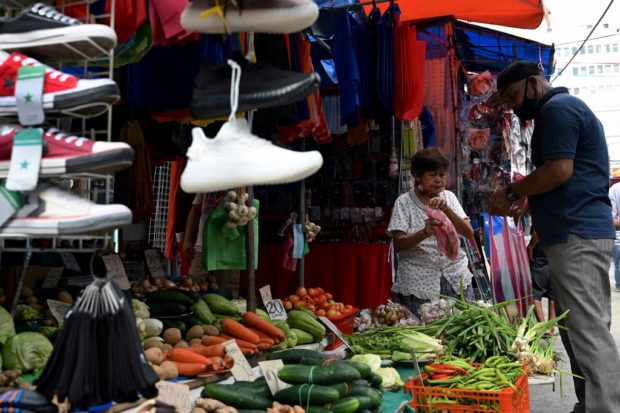
A man buys vegetables from a street stall in Quiapo, Manila on July 5, 2022. (Photo by JAM STA ROSA / AFP)
MANILA, Philippines — While production at the country’s factories sustained growth in May, the manufacturing sector’s sales slowed down as consumers’ savings got squeezed by high prices of goods and services.
A proxy for factory output, the volume of production index (VoPI) inched up 1.9 percent year-on-year last May, the Philippine Statistics Authority’s (PSA) latest monthly integrated survey of selected industries (Missi) report released on Thursday showed.
May’s VoPI increase was faster than the 1.2 percent in April. The PSA said 14 of the 22 industries covered by Missi posted growth in May, led by the 50.7-percent jump in production volume of the machinery and equipment (except electrical) manufacturing sector.
On the flipside, electrical equipment manufacturers had the biggest VoPI drop of 19.7 percent that month.
The value of production index (VaPI) also rose 8.9 percent in May, faster than April’s 7.6 percent.
The PSA said 15 manufacturing sectors grew their respective VaPI last May, also led by the 60.8-percent climb in the manufacture of machinery and equipment except electrical. However, production of electrical equipment slid the fastest in terms of production value, with a 16.4-percent year-on-year decline.
The Missi report for May also showed that the growth in volume of net sales eased to 11.1 percent year-on-year in May from 18.5 percent last April, Pantheon Macroeconomics chief emerging Asia economist Miguel Chanco noted.
“The result was better than we expected,” Chanco said in his report, as “an adverse base effect partly is to blame.”
Last year’s sales growth soared amid economic reopening from the most stringent COVID-19 lockdowns imposed at the onset of the pandemic in 2020. However, Chanco said “it’s increasingly clear that the momentum in household spending is waning persistently in the face of high and rising inflation.”
Due to expensive food and fuel, the rate of increase in prices of basic commodities averaged 4.4 percent during the first half, above the Bangko Sentral ng Pilipinas’ (BSP) 2-4 percent target band of manageable price hikes conducive to economic growth.
“On our adjustment, sales fell by 0.4 percent month-on-month in May, extending the 0.5-percent correction in April. Adjusted sales slipped, albeit minimally, as a percentage of the pre-COVID-19 level, to 102 percent from 103 percent in the previous two months, highlighting the steady loss in upward momentum since February,” Chanco said.
“Looking ahead, we continue to expect private consumption to remain under pressures from inflation, in the short run, and from the structural rebuild in savings lost during the pandemic, over the longer term. To be sure, remittances could provide more impetus — temporarily — in the next few months, with the peso’s ongoing sell-off implying more bang for each buck sent home,” Chanco added.
The peso’s currently trading at its weakest against the US dollar in almost 17 years.
RELATED STORY:
Peso seen sinking to new record low in Q1 2023

